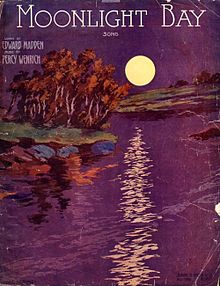| "Moonlight Bay" | |
|---|---|
 Cover, sheet music, 1912 | |
| Song | |
| Language | English |
| Published | 1912 |
| Songwriter(s) | Composer: Percy Wenrich Lyricist: Edward Madden |
| Audio sample | |
Recording of Moonlight Bay, performed by the American Quartet (1911) | |
"Moonlight Bay" is a popular song. It is commonly referred to as "On Moonlight Bay". The lyrics were written by Edward Madden, the music by Percy Wenrich, and was published in 1912. It is often sung in a barbershop quartet style. Early successful recordings in 1912 were by the American Quartet and by Dolly Connolly. [1]